Pan 20 mg (Pantoprazole)
Pan 20 mg contains Pantoprazole, a proton pump inhibitor (PPI) used to reduce excess stomach acid. It provides relief from acid reflux, heartburn, gastritis, and peptic ulcers.
PAN 20 Tablet belongs to the class of drugs known as Proton pump inhibitor, which reduces the amount of acid your stomach makes. It treats gastroesophageal reflux disease (GERD), stomach ulcers, Zollinger-Ellison syndrome (overproduction of acid due to a pancreatic tumour), duodenal ulcers, gastric ulcers, and Crohn’s disease-associated ulcers.
PAN 20 Tablet helps reduce stomach acid by blocking the action of an enzyme (H+/K+ ATPase, also known as the gastric proton pump), thus prevents the release of stomach acid and relieving symptoms of food pipe lining inflammation (esophagitis), gastroesophageal reflux disease (GERD), or heartburn.
Not everyone who is taking PAN 20 Tablet will get these side effects. PAN 20 Tablet may have common side effects, such as headache, diarrhoea, nausea, abdominal pain, vomiting, dizziness, and joint pain. These side effects are temporary and may resolve on their own over time. However, if these side effects persist, don’t hesitate to contact your doctor.
Take PAN 20 Tablet as advised. Your physician will decide the dosage based on your medical condition. You should take PAN 20 Tablet 30 minutes before food. It is recommended not to exceed the recommended dose of PAN 20 Tablet . Do not chew, crush, or break the medicine.
Inform your physician if you are allergic to PAN 20 Tablet . Tell your doctor if you have stomach or intestinal cancer, liver problems, are allergic to PAN 20 Tablet or will have an endoscopy in the future. Prolonged intake of PAN 20 Tablet may cause a deficiency of Vitamin B12 and low levels of calcium, magnesium and Vitamin D, leading to osteoporosis. PAN 20 Tablet is not recommended for children below 5 years of age. Consult the doctor if you are pregnant or breastfeeding.
Side Effects of PAN 20 Tablet
- Headache
- Diarrhoea
- Nausea
- Abdominal pain
- Vomiting
- Flatulence
- Dizziness
- Joint pain
Uses of PAN 20 Tablet
PAN 20 Tablet is used to treat peptic ulcers, heartburn, and hyperacidity. The following are the specific applications of PAN 20 Tablet :
- Gastric reflux disease (GERD): PAN 20 Tablet is frequently used to treat GERD by decreasing the production of stomach acid, which lessens the symptoms of acid reflux and heartburn.
- Erosive Esophagitis: This medication efficiently promotes healing and symptom relief for this ailment, which is brought on by inflammation and damage to the oesophagus as a result of acid reflux.
- Peptic Ulcers: By lowering stomach acid, PAN 20 Tablet can be used to treat peptic ulcers and promote the healing of the affected areas.
- Zollinger-Ellison Syndrome: This uncommon ailment results in an overabundance of stomach acid. PAN 20 Tablet considerably lowers acid secretion, which aids with symptom management.
Directions for Use
- PAN 20 Tablet should be taken 30-60 minutes before a meal to enhance absorption and effectiveness.
- It is usually taken once daily in the morning or as advised by your doctor. If prescribed twice daily, take the second dose before dinner.
- Swallow PAN 20 Tablet as a whole with a glass of water.
- Do not crush, chew, open, or break it.
Medicinal Benefits
- PAN 20 Tablet is effective in healing erosive esophagitis (inflammation of the food pipe), heartburn, Zollinger-Ellison syndrome, duodenal ulcers, gastric ulcers, and Crohn’s disease-associated ulcers.
- PAN 20 Tablet works by irreversibly blocking the proton pump gate, which secretes stomach acid. It can be prescribed to all age groups, including special populations like the elderly, pregnant, lactating mothers, and patients with kidney and liver disease.
- PAN 20 Tablet helps manage acidity-related conditions, promotes digestion, and provides relief from associated discomfort.
How PAN 20 Tablet Works
Storage
- Hydrate your body: Drink enough water to prevent dehydration and headaches.
- Calm Your Mind: Deep breathing and meditation can help you relax and relieve stress.
- Rest and Recharge: Sleep for 7-8 hours to reduce headache triggers.
- Take rest: lie down in a quiet, dark environment.
- Cold or warm compresses can help reduce tension.
- Stay Upright: Maintain good posture to keep symptoms from getting worse.
- To treat headaches naturally, try acupuncture or massage therapy.
- Over-the-counter pain relievers include acetaminophen and ibuprofen.
- Prescription Assistance: Speak with your doctor about more substantial drug alternatives.
- Severe Headaches: Seek emergency medical assistance for sudden, severe headaches.
- Frequent Headaches: If you get reoccurring headaches, consult your doctor.
- Headaches with Symptoms: Seek medical attention if your headaches include fever, disorientation, or weakness.
- Inform Your Doctor: Notify your doctor immediately about your diarrhoea symptoms. This allows them to adjust your medication or provide guidance on managing side effects.
- Stay Hydrated: Drink plenty of fluids to replace lost water and electrolytes. Choose water, clear broth, and electrolyte-rich drinks. Avoid carbonated or caffeinated beverages to effectively rehydrate your body.
- Follow a Bland Diet: Eat easy-to-digest foods to help firm up your stool and settle your stomach. Try incorporating bananas, rice, applesauce, toast, plain crackers, and boiled vegetables into your diet.
- Avoid Trigger Foods: Steer clear of foods that can worsen diarrhoea, such as spicy, fatty, or greasy foods, high-fibre foods, and dairy products (especially if you’re lactose intolerant).
- Practice Good Hygiene: Maintain good hygiene to prevent the spread of infection. To stay healthy, wash your hands frequently, clean and disinfect surfaces regularly, and avoid exchanging personal belongings with others.
- Take Anti-Diarrheal Medications: If your doctor advises, anti-diarrheal medications such as loperamide might help manage diarrhoea symptoms. Always follow your doctor’s directions.
- Keep track of your diarrhoea symptoms. If they don’t get better or worse or are accompanied by severe stomach pain, blood, or dehydration signs (like extreme thirst or dark urine), seek medical help.
- Inform your doctor about the nausea and discuss possible alternatives to the medication or adjustments to the dosage.
- Divide your daily food intake into smaller, more frequent meals to reduce nausea.
- Opt for bland, easily digestible foods like crackers, toast, plain rice, bananas, and applesauce.
- Avoid certain foods that can trigger nausea, such as fatty, greasy, spicy, and smelly foods.
- Drink plenty of fluids, such as water, clear broth, or electrolyte-rich beverages like coconut water or sports drinks.
- Use ginger (tea, ale, or candies) to help relieve nausea.
- Get adequate rest and also avoid strenuous activities that can worsen nausea.
- Talk to your doctor about taking anti-nausea medication if your nausea is severe.
- Record when your nausea occurs, what triggers it, and what provides relief to help you identify patterns and manage your symptoms more effectively.
- Preventing Vomiting (Before it Happens)
- Take medication exactly as prescribed by your doctor. This can help minimize side effects, including vomiting.
- Having a small meal before taking your medication can help reduce nausea and vomiting.
- Talk to your doctor about taking anti-nausea medication along with your prescribed medication.
- Managing Vomiting (If it Happens)
- Try taking ginger in the form of tea, ale, or candy to help alleviate nausea and vomiting.
- What to Do if Vomiting Persists
- Consult your doctor if vomiting continues or worsens, consult the doctor for guidance on adjusting your medication or additional treatment.
- Tell your doctor about your GAS symptoms. They may change your medication regimen or prescribe additional drugs to help you manage them.
- To manage GAS symptoms, eat a balanced diet of fibre, vegetables, and fruits.
- Drink enough water throughout the day to avoid constipation and treat GAS symptoms.
- Regular exercise like yoga and walking may help stimulate digestion and alleviate GAS symptoms.
- Take probiotics only if your doctor advises, as they may help alleviate GAS symptoms by promoting gut health.
- Take medication for GAS symptoms only if your doctor advises, as certain medications can interact with your existing prescriptions or worsen symptoms.
- If symptoms persist, worsen, or are accompanied by severe abdominal pain, vomiting, or bleeding, seek immediate medical attention.
- Inform your doctor about dizziness symptoms. They may adjust your medication regimen or prescribe additional medications to manage symptoms.
- Follow your doctor’s instructions for taking medication, and take it at the same time every day to minimize dizziness.
- When standing up, do so slowly and carefully to avoid sudden dizziness.
- Avoid making sudden movements, such as turning or bending quickly, which can exacerbate dizziness.
- Drink plenty of water throughout the day to stay hydrated and help alleviate dizziness symptoms.
- If you’re feeling dizzy, sit or lie down and rest until the dizziness passes.
- Track when dizziness occurs and any factors that may trigger it, and share this information with your doctor to help manage symptoms.
- Please inform your doctor about joint pain symptoms, as they may adjust your medication regimen or prescribe additional medications to manage symptoms.
- Your doctor may prescribe common pain relievers if necessary to treat joint discomfort.
- Maintaining a healthy lifestyle is key to relieving joint discomfort. Regular exercise, such as low-impact sports like walking, cycling, or swimming, should be combined with a well-balanced diet. Aim for 7-8 hours of sleep per night to assist your body in repairing and rebuilding tissue.
- Applying heat or cold packs to the affected joint can help reduce pain and inflammation.
- Please track when joint pain occurs and any factors that may trigger it, and share this information with your doctor to help manage symptoms.
- If your joint pain is severe or prolonged, consult a doctor to rule out any underlying disorders that may require treatment.
What if I have taken an overdose of PAN 20 Tablet
Drug Warnings
- Avoid taking PAN 20 Tablet if you are allergic to PAN 20 Tablet or have any history of gastric cancer, liver disease, low magnesium levels, or low vitamin B1.
- Prolonged intake of PAN 20 Tablet may cause lupus erythematosus (an inflammatory condition in which the immune system attacks its own tissues), vitamin B12, and magnesium deficiency.
- PAN 20 Tablet may interact with blood thinners, antifungals, anti-HIV drugs, iron supplements, and anti-cancer medications. Please inform your doctor if you are taking any of these medications.
- Intake of PAN 20 Tablet may mask the symptoms of gastric cancer, so if you have any severe stomach pain or blood in stool, immediately consult the doctor.
- This medicine is not recommended for use in children below 5 years of age.
- Although PAN 20 Tablet is safe for use during pregnancy or breastfeeding, inform your doctor if you are pregnant or breastfeeding before starting treatment with PAN 20 Tablet .
- Let your doctor know if you are taking any other medicines, including supplements and herbal products, to prevent any interactions.
- It is always important to check the expiry date of the medicine. Discard the medicine if it reaches the expiry date.
| Quantity |
|---|

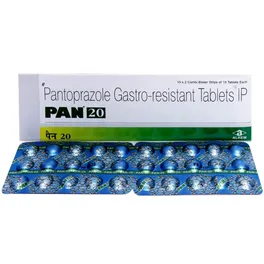
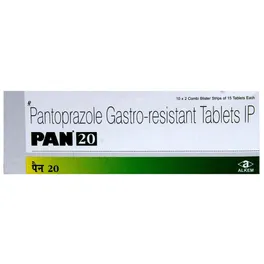
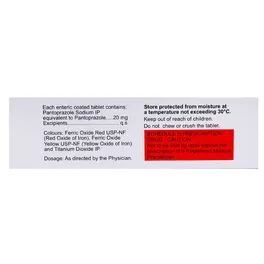
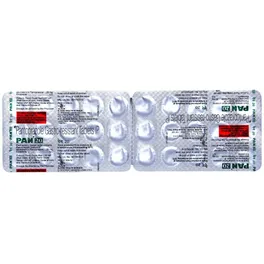
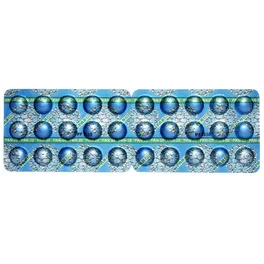
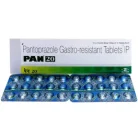
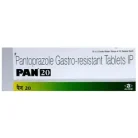
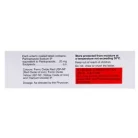
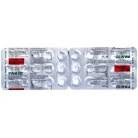
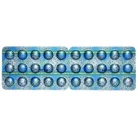
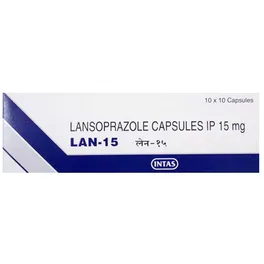
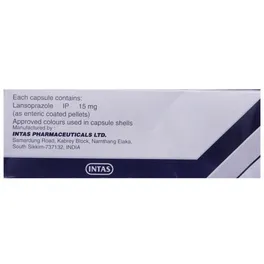


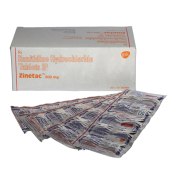
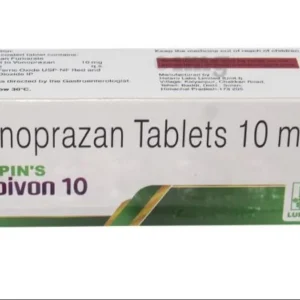
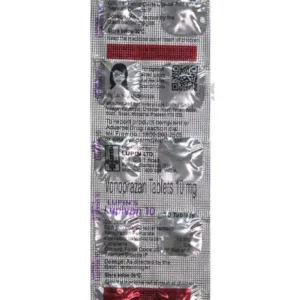
Reviews
There are no reviews yet.